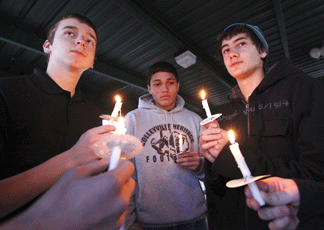By Kelli Henderson/entertainment editor
In almost every building on campus, students with dwindling grade-point averages can find academic sanctuary.
TCC offers many resources from help on homework to one-on-one tutoring with professors. Students just need to know where to go.
As one of the three full-time licensed counselors on NE Campus, Anita Peters said many suspended students come in for academic help.
“It’s important to figure out what happened, what set the stage,” she said. “Obviously, [they’re] bright. Obviously, [they’re] motivated, or they wouldn’t be coming into my office. I respect that. But something didn’t work for them, so let’s figure out what didn’t work and help do some things differently.”
Peters said students who are starting to do poorly in their courses should learn how to calculate their GPA to know exactly where they stand. They can also retake a course with the highest of the two semester grades counted.
Students tend to get overwhelmed in college with new surroundings, and the new work format can be tough, Peters said.
“Students I’m seeing, even on suspension, very often are taking too many classes and trying to work too many hours,” she said. “College is different. It’s not structured the same [as in high school]. The work that is required isn’t the same. It’s a lot more independent, and, for some people, it’s just a really big shift.”
Students struggling in math, science or writing can visit centers for a quiet place to study or get one-on-one help with a specific problem or chapter. These are good resources with free tutoring, Peters said.
“I think they are all wonderful,” she said. “I think students need to make a good faith effort in using those before students even start coming in here to talk about what I can do. Take advantage of those first, and see if those help.”
The math and science learning centers on NE both offer a wide spectrum of tools for students to use when trying to improve GPAs.
Daniel Golconda, instructional associate for NE’s math and physics lab and testing center, said his area offers tutoring, textbooks and calculators. Students can also come in and just do homework, he said.
“We’ve implemented a couple of programs, one-on-one tutoring for students on the verge of passing or not passing their classes, so we can go more in-depth,” he said. “We also started exam reviews. People can sign up per class for specific tests. It’s kind of like a study group.”
Trying to accommodate students with any schedule, the math lab has extended its hours to 10 p.m. Monday-Thursday and is open 7 a.m.-5 p.m. Friday and Saturday.
“We are trying to make this as open as we can, as accessible as we can,” Golconda said. “That way, students can come and get help when they need to.”
NE’s math and physics testing center is located in NTAB 2204. For more information, students can call 817-515-6753.
Students in both core and advanced science classes use the NE science learning center. Grant-funded for students to prepare for the allied health programs, the center offers numerous learning resources from microscopes and textbooks to specimens and interactive DVDs.
Anu Rajpurohit and Corbin Flint, both instructional associates for biology and chemistry, said students having trouble should visit the center as frequently as possible. Students also need to do work outside the classroom before and after lectures and labs, Flint said.
“I’m seeing that [students] are frantically writing, trying to keep up with the instructor. If they read, it would reduce stress,” he said. “If you’re taking sciences, it’s essential to read a textbook before you go to class.”
The science learning center provides free tutoring for groups or individual students in anatomy and physiology, microbiology, chemistry and biology.
Located in NHSC 1215, the center is open until 9 p.m. Monday-Thursday and 5 p.m. Friday and Saturday. Students with questions can call 817-515-6715.
The S.O.S. Center is one of the newest tutoring centers on NE. It provides one-on-one tutoring with professors from specific courses and helps students by using tutorials accessible anywhere with the Internet.
“The S.O.S. Center is a non-threatening environment,” said Diane Pierce, instructional aide for the center. “It’s different than the [other centers] in that, really, it is professors that work with the students. My co-worker and I will work and help students as we can, but really our center is designed for professors to interact with students.”
Different professors for different subjects work in the center each day. Students can check faculty availability on the S.O.S. calendar on the Campus Cruiser website under the Campus Life tab, Pierce said.
“I think the center is for anyone, but it’s real important the student try to interact with their own professor [before visiting the S.O.S. Center],” she said. “Especially if there’s something going on in their life, they really need to communicate to their professor what’s going on, so they can work with them.”
Pierce said it is best for students who want to raise their GPA to come as frequently as possible and ask as many questions as they can.
“I think there are a lot of opportunities for students to seek out help,” she said. ”They just have to be willing to seek help.”
The center is open till 6 p.m. Mondays and Thursday, 8 p.m. Tuesday and Wednesday, 4 p.m. Friday and 2 p.m. Saturday.
To reach a coordinator for the S.O.S. Center, call 817-515-6433.


























